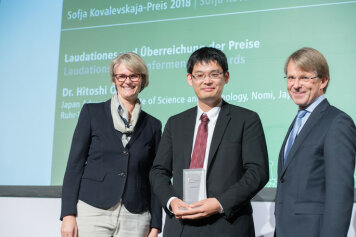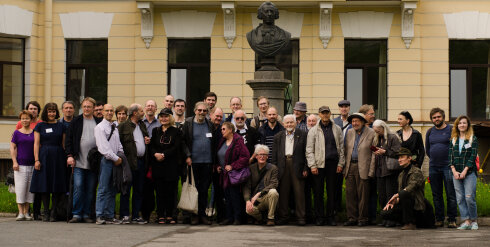December 2018
Prof. Hitoshi Omori (together with Prof. Yasuo Deguchi and Dr Filippo Casati) organized the workshop What's so bad about dialetheism? From historical, logical and philosophical points of view (Priestfest 2018), Kyoto, December 15-17, 2018.Prof. Heinrich Wansing gave an invited talk at that workshop, titled "One heresy and one orthodoxy. On dialetheism, dimathematism, and the non-normativity of logic."
November 2018
Dr Luca Tranchini (Tübingen), gave a talk in the Colloquium on Logic and Epistemology, titled "Proofs and refutations in 2-Intuitionistic logic."
On November 22nd, Dr Hitoshi Omori received his Sofja Kovalevskaja Award. It was conferred by the Federal Minister of Education and Research, Ms Anja Karliczek MdB, and the president of the Alexander von Humboldt Foundation, Prof. Hans-Christian Pape.

From November 16-21, Dr Daniel Skurt and Prof. Heinrich Wansing visited their project partners in Novosibirsk, Prof. Sergei Odintsov, Dr Sergey Drobyshevich, and Dr Stanislav Speranski (St Petersburg) and gave talks at the 2018 Mal'tsev Meeting.
A visit to N*:
October 2018
Prof. Heinrich Wansing joined the scientific committee of the conference ExLog2019, "Explaining explanation using new developments in logic and formal semantics. Hyperintensionality, relevance, counterfactuals, grounding and truth-maker semantics," UCLouvain, Louvain-la-Neuve, Belgium.
September 2018
Prof. Heinrich Wansing gave invited talks at the Refutation Symposium 2018, September 14-15th, 2018, which was part of the Poznan Reasoining Week and at the 9th ConferencNon-Classical Logic. Theory and Applications, Nicolaus Copernicus University, Torun, 24-27th September, 2019
August 2018
Sofja Kovalevskaja Award for Hitoshi Omori
The Alexander von Humboldt Foundation has singled out six international researchers between 31 and 36 years of age for one of Germany’s most valuable science awards: the winners will each be granted up to €1.65 million.
With the Sofja Kovalevskaja Award, young researchers receive risk capital for innovative projects during an early stage in their careers. The Sofja Kovalevskaja Award allows them to conduct research at a German university or research institute for a period of up to five years and develop their own research groups for this at their host institutes. The award is financed by the Federal Ministry of Education and Research.
The Sofja Kovalevskaja Awards will be presented to the recipients on 22 November in a formal ceremony in Berlin.
Logic is the science of deduction. It focuses on investigating the validity of arguments. One of the principles of classical logic is ex falso sequitur quodlibet (Latin for “from falsehood anything follows”) whereby contradiction unavoidably leads to a statement being arbitrary. The theoretical philosopher Hitoshi Omori is considered an expert in non-classical logic, particularly paraconsistent logic and so-called dialetheism. Here, contradictions are tolerated. The objective is to study how logically-relevant argumentation and theories can be built on the basis of contradictory information. In this fundamental research effort, Hitoshi Omori works at the intersection of philosophy and mathematics. In Bochum, the Sofja Kovalevskaja award winner will seek, amongst other things, to develop a systematic understanding of paraconsistent logic and investigate connections to the history of philosophy.
Host institute: Ruhr-Universität Bochum, Chair of Logic and Epistemology Host: Professor Dr Heinrich Wansing
Dr Hitoshi Omori
Born in Japan, Hitoshi Omori studied at Tokyo Institute of Technology, where he also completed his doctorate. He subsequently became a postdoc at the City University of New York, United States, and various universities in Japan and was also a visiting researcher at the University of Melbourne, Australia, the University of St Andrews, United Kingdom, and Ruhr-Universität Bochum. It is here that he will continue his research as of December 2018 as the recipient of a Sofja Kovalevskaja Awardee.
Congratulations, Hitoshi!
July 2018
Damian Szmuc (University of Buenos Aires) gave a talk on "Refining the Collapse Argument against Logical Pluralism" in the research colloquium on Logic and Epistemology on July 5, and Dr Hitoshi Omori (Japan Advanced Institute of Science an Technology, JAIST) presented a talk on "Observations on the 'just true' problem" on July 12.
June 2018
On June 28, Prof. Sergei Odintsov (Sobolev Institute of Mathematics, Novosibirsk) gave a talk titled "Trump Realizability versus Nelson's Realizability" in the research colloquium on Logic and Epistemology, and on June 21, Dr Shay Logan (North Carolina State University) presented a talk on "Constant Domain Semantics for Quantified Relevance Logics."
A delegation from Bochum participated in the 4th Leipzig-Bochum Compact Seminar in logic at the University of Leipzig in connection with the Master's Programme in Logic at Leipzig University. The topic was Structural Proof Theory.
May 2018
Prof. Heinrich Wansing was an invited speaker at the conference Logical Perspectives 2018, Saint Petersburg, May 14–18, and gave a talk on "Connexive conditional logic".
The speakers:

April 2018
On April 26, Prof. Pierluigi Minari (University of Florence) presented a paper titled "Proof-theoretical methods in equational theories of untyped operations: a survey."
Dr Zach Weber (University of Otago) updated the list of members of the Logicians’ Liberation League on the AAL website, see http://aal.ltumathstats.com/curios/logicians-liberation-league. Heinrich Wansing entered the LLL in December 2013.
Prof. Heinrich Wansing had the pleasure to be part of the examination committee for Dr Joan Casas Roma's PhD thesis Deeper Down the Rabbit-Hole: Unfolding the Dynamics of Imagination Acts at the Universitat Oberta de Catalunya, Barcelona. Dr Casas Roma passed with distinction. Congratulations,Joan!.
March 2018
Dr Malgorzata Kruszelnicka (Opole University) visited the logic group at RUB from March 12-23. She gave a talk titled "Characteristic Formulae for Intuitionistic First-Order Logic" and she participated in a workshop on the logic of imagination.
Christopher Badura organized two events at RUB: The conference Philosophy of Imagination, March 15-16, and the workshop Logic(s) for Imagination, March 14. The invited speakers at the conference were
The speakers at the workshop were Christopher Badura, Lisa Benossi, Francesco Berto, Joan Casas Roma, Joan Gimeno Simó, Dominik Kauss, Pierre Saint-Germier, and Heinrich Wansing.
After completing her M.A. thesis titled "Proof-theoretic semantics and paradoxes," Sara Ayhan took up a position as a doctoral student. Her PhD project on proof-theoretic semantics is supervised by Prof. Heinrich Wansing and Prof. Peter Schroeder-Heister (Tübingen). Welcome to the team, Sara!
February 2018
A call for papers was issued for for a Synthese special issue: Varieties of Entailment. Essays dedicated to the memory of Carolina Blasio, Guest Editors: Heinrich Wansing (Ruhr University Bochum) and Marco Ruffino (University of Campinas), see https://philevents.org/event/show/41678.
A contract for a new book series Mind, Meaning and Metaphysics with Bloomsbury Publishing was signed. The editors are Christopher Gauker, Mark Textor, Max Kölbl, and Johannes Brandl. Heinrich Wansing is part of the editorial board.
January 2018
Prof. Sergei Odintsov (Sobolev Institute of Mathematics, Novosibirsk) and Prof. Heinrich Wansing (RUB) started their joint research project on FDE-based modal logics, supported by the Russian Foundation for Basic Research, RFBR, and the Deutsche Forschungsgemeinschaft, DFG. Other members of the research team are Dr Daniel Skurt (Bochum), Dr Sergey Drobyshevich (Novosibirsk), and Dr Stanislav Speranksi (Saint Petersburg)